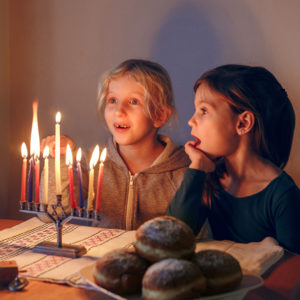4 Ways Foster Parents Can Support Children in Foster Care Through the Holidays

December 1st brings the holiday season and all the festivities, gatherings, and complicated emotions to the forefront of everyone’s lives. For youth experiencing foster care, holidays like Christmas, Hanukkah and Kwanzaa can be a reminder of the family they’re apart from or have lost, of lost traditions and memories, and all the changes they’ve endured. For the foster parents and families who care for these youth, this time of year is often a whirlwind of busy schedules, changing routines and so much more.
Make a powerful difference in a child’s life. Become a foster parent.

For children who have experienced abuse, neglect or other trauma, the holidays may be difficult to get through and evoke feelings of sadness, loss and grief.
Mary Tolley, a KVC foster parent, knows the heartaches and joys this season brings firsthand. She says the youth she has cared for miss their families and traditions, but she’s grateful for the opportunity to support them during this challenging time.
“They struggle with their loss and sometimes they struggle to allow us to feel their void. Of course there are many blessings to sharing such a big holiday with kids in our care…but no blessing comes without its struggle. It’s certainly a balance. Seeing kids be involved in Christmas traditions that most times they have never done is extra special. Some have never decorated a tree, decorated Christmas cookies, even the small traditions are so exciting,” said Tolley.
Support Children in Your Care Through the Holidays
As your family recognizes and celebrates special days, remember that if a child in care is struggling with grief and other strong emotions, you may need to pause to provide some extra support. Here are four ways you can provide encouragement and support to children in your care during the holiday season.
- Create a safe space where they feel they can openly share. Ask them how they’re feeling and allow them the time and space to open up as they’re ready. Encourage your child to share their feelings about the losses they have experienced and not bottle them up. This will reinforce that emotions are normal, valid and important.
- Remember there is no right or wrong way to handle special occasions. You may choose to follow family traditions or do things a little differently. What you do one year may not be what you do the next. No matter what, be sure to do the things that are special and important for your entire family.
- Talk with your child about their past celebrations and holidays. If possible, gather information about the child’s previous positive memories so you can incorporate them into your current family traditions. Involve your entire family and make decisions together about how to recognize and celebrate special occasions.
- Remember that your child’s challenging behaviors on special occasions relates to their grief. Grief can cause children to behave in unacceptable ways, but it’s important understand and accept their feelings rather than to become angry with them. Work to ensure that the way you recognize and celebrate special occasions provides an opportunity for your child to heal.
Grateful For the Opportunity to Help Kids in Need
Reflecting on what she’s grateful for this December, Alexis Stewart, KVC foster parent said, “I’m grateful for all of the staff and case workers, who work so hard to start new families, and keep families together when possible. I’m grateful to live in a community where people will go out of their way to help each other. And I’m especially grateful for the kids experiencing their first real Christmas.”
“We are grateful for the opportunity to foster more than anything! Our family loves the children who are placed with us just as we do our own biological daughter. We love to show them that we appreciate them extra during this Christmas season,” said Jennifer Clark, KVC foster parent.
Originally inspired to become foster parents after struggling to have their own children, and caring for their nephew for 5 years, Stewart and her husband wanted to offer a safe, loving home for children while their biological caregivers worked toward reunification.
“We knew we wanted to be parents, and we knew we could cope with raising a child for awhile and watch them reunify with their family. My husband has always been a helper, he was in military, he was a volunteer fire fighter. So wanting to help children and give them a loving, safe place to stay felt almost like a calling. Through foster care, we adopted our two daughters, and continue to foster,” said Alexis Stewart.
Help As a Foster Parent
In West Virginia, more foster and adoptive parents are needed than ever before. The most significant way you can help is by becoming a foster parent. We’re especially looking for people willing to care for siblings sets and teens. Click here to talk with our foster parent recruiter!
